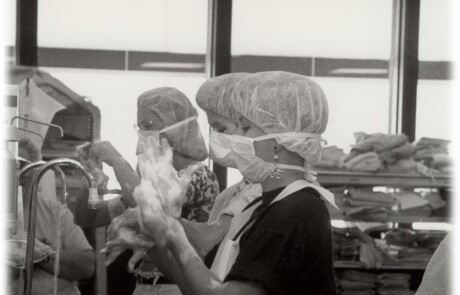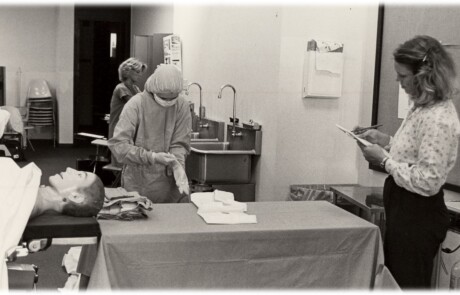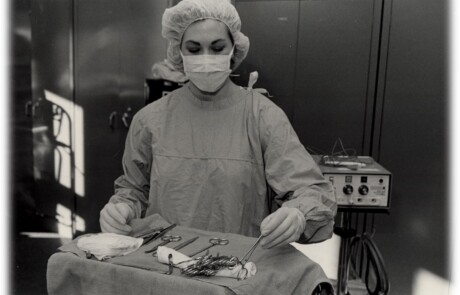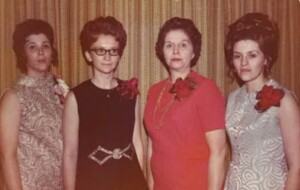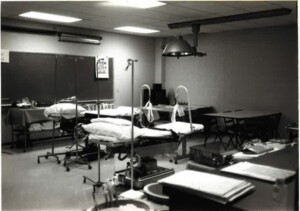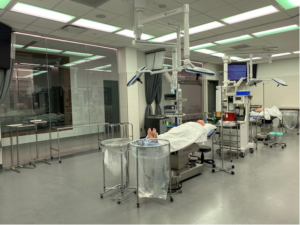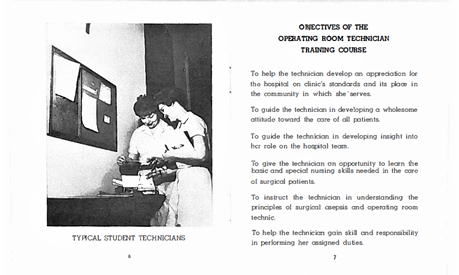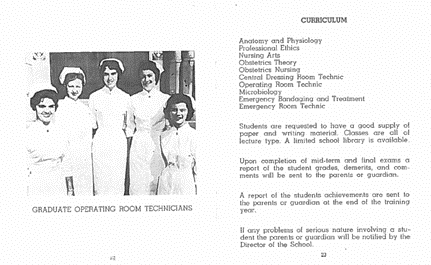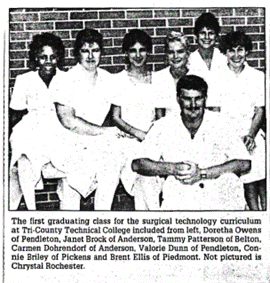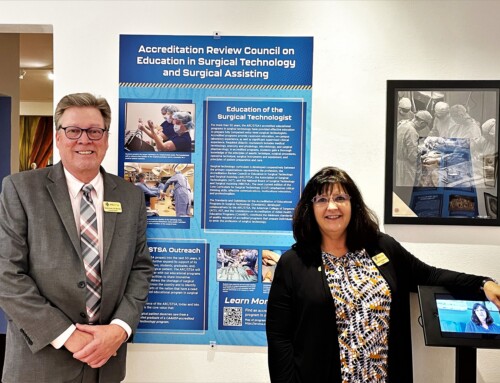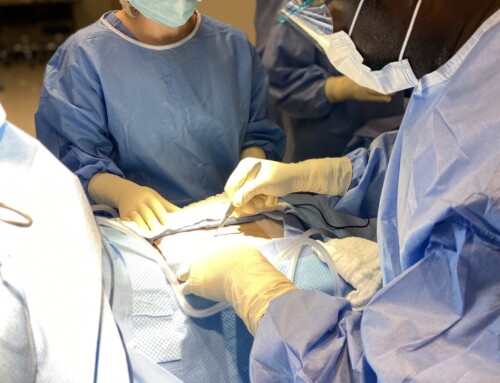Our golden anniversary year is coming to an end, but stories of our longest continuously-accredited programs will continue. Stay tuned for more in 2023, and enjoy these stories of four programs each accredited for more than four decades. Featured in this issue are the surgical technology programs at Parkland College, Champaign, IL; Ivy Tech Community College, Lafayette, IN; Southeast Community College, Lincoln, NE; and, Tri-County Technical College, Pendleton, SC.
Parkland College, Champaign, Illinois
Surgical technology program founded in 1971 and continuously accredited since August 1977
Program Director Janice Grewatz, BS, CSFA, CSPDT, CST, FAST
Please tell us about your program, including some of its history.
Parkland College opened its doors in 1967, holding classes at temporary sites until the campus fully opened in 1973. The surgical technology program was added in 1971 and applied for initial accreditation in 1974. Below are some pictures of the program from its early years in the 1970s-1980s.
How did Parkland College and the program celebrate its 50 years?
The program celebrated its 50th anniversary in 2021. Due to COVID-19 restrictions the program was not able to celebrate until 2022, when we welcomed members of the community, alumni, and past instructors to campus for an open house and to tour the current facilities and campus. A small reception was held to commemorate the event with the keynote address being delivered by a long-standing supporter of the program, Dr. James Harms.
What is your program most proud of accomplishing?
The program is proud to have graduated more than 700 surgical technologists. The program’s success is attributed to the six program directors, six full-time faculty members and numerous part-time lab assistants who have been dedicated to the program in its 50+ years.
Southeast Community College, Lincoln, Nebraska
Surgical technology program founded in 1971 and continuously accredited since June 1976
Program Director Casey Glassburner, MA, CST, FAST
Please tell us about your program, including some of its history.
The program was started in 1971 with the first class of 4 students graduating on February 24, 1972 (pictured below). At the time, the college was called Lincoln Nebraska Technical Community College and awarded a diploma in Operating Room Technology. The first program director was Phyllis Kendle, BS, RN. I have been Program Director since 2020 and am proud to be a graduate of the program.
Why was accreditation important then and now?
Achieving and continuing to maintain accreditation is vital to the success of the surgical technology program at Southeast Community College. We are 100% committed to ensuring the program provides students with the information necessary to allow them to provide the safest patient care. By meeting and exceeding the standards of accreditation we can assure our students we are committed to the gold standards in surgical technology education as set forth by ARC/STSA. The program continuously uses accreditation standards to assess our outcomes and our quality. Daily we look for ways to better serve our students, our constituents and ultimately to better serve surgical patients. Our program firmly believes accreditation gives validity and value to the education and to the degree that graduates achieve, thereby providing an advantage that is invaluable.
How has the program changed over the past 50 years? What is on the horizon?
The program transitioned to an Associate of Applied Science degree in the fall of 1996, added an online option in 2000, and in 2019 restructured the curriculum content moving from a 10-week quarter-based system to a 16-week semester-based system. We moved to a brand new, state-of-the-art Health Sciences Building for the classes beginning in January 2021, graduated our largest class of 28 surgical technologists in December 2021, and accepted our largest cohort of 40 students for the 2022 class! The future of the program continues to focus on growth in number of students accepted, number of graduates and number of clinical sites. We continue to look for ways to partner with fellow health professions including participation in interdisciplinary simulations and include additional experiences for our students such as taking call and working evening/night shifts.
To celebrate our 50 years of continuous accreditation in 2026, the program plans to invite alumni to tour the new Health Science Building and reflect on achievements throughout the years.
SCC’s surgical technology lab, then and now
What is your program most proud of accomplishing in its 50 years?
The biggest accomplishment of our program is that we have graduated 1,045 individuals over the past 50 years! We are proud of the quality of the graduates we have supplied to our community healthcare providers, evolving to ensure content is relevant to current practice, and consistently maintaining accreditation.
Through our program, we have helped these graduates find a purpose larger than themselves and helped fuel their passion to help patients.
Ivy Tech Community College, Lafayette, Indiana
Surgical technology program founded in 1952 and continuously accredited since December 1976
Program Director Lyla Etchison, MEd, CSFA, CST
Please tell us about your program, including some of its history. When did the program first start?
Our program began at St. Elizabeth Hospital in Lafayette, Indiana, in 1952, and was the first operating room technician training program in the country. Sister M. Mirella, supervisor of surgery at ST. Elizabeth Hospital from 1951 to 1957, observed firsthand the void of professionally trained personnel qualified to perform specific duties in the operating room. The program was taken over by Tippewa Institute, part of Indiana Vocational Technical College of Indiana, which later became known as Ivy Tech Community College. One of the things of which I am most proud is that my uncle helped Ivy Tech in Lafayette get started. I can remember going as a child with my aunt to take dinner to him while Ivy Tech was in the building stages. I am also a graduate of the program and have been an instructor with the program for six years and program director since 2021.
How has the program changed over the past 50 years? What is on the horizon?
With technology in the operating room advancing rapidly over the last 50 years, our program has continuously evolved to provide our students with up-to-date education. Take a peek at a few pages from the 1960s handbook to see just how far we have all come.
Why was accreditation important then and now?
Accreditation provides a consistent educational guide so that all graduates of surgical technology programs become proficient in operating room skills. This consistency of educational quality is crucial to provide excellent patient-centered care.
Tri-County Technical College, Pendleton, South Carolina
The surgical technology program at Tri-County Technical College in Pendleton, South Carolina, was founded in 1965 and was first accredited on November 28, 1975, making it one of the first surgical technology programs accredited by what was then the American Medical Association’s Council on Medical Education. Read more on the history of ARC/STSA and how it began as the Joint Review Committee on Educational Programs for the Operating Room Technician. Donna Palmer, BS, RDH, CDA, Department Head of Health Professions, shares details of the program, then and now.
Please tell us about your program, including some of its history.
The program’s first program director was Margaret “Peggy” Thomas, RN. The program began as McDuffie Vocational High School in Anderson, South Carolina, with an articulation agreement with Anderson Memorial Hospital, now called AnMed Health Medical Center. In 1988, the program sponsorship was transferred to Tri-County Technical College. The first cohort graduated from TCTC in August 1989 with a pinning ceremony of 8 students (pictured below).
Why was accreditation important then and now?
Accreditation is even more important now to the student entering the surgical technology program than it was 50 years ago. Employers in the surgical technology field seek and expect students from accredited programs these days, as accreditation assures that we prepare students to succeed in the profession.
Today, maintaining our accreditation status for the program sets us apart from others that are non-accredited since we must adhere to high standards for our college, our students, and their prospective employers.
What changes has your program seen in its almost 50 years?
In early days, program had only a handful of instructional materials and no laboratories in which to practice skills or mock surgeries before going into the actual operating rooms. Today, students have an abundance of learning aids, instruments, trays, supplies and equipment to sufficiently practice lab skills, and participate in true-to-life mock surgeries to perfect their skills prior to starting their clinical educational rotation. In August 2020 we began our first-ever associate degree cohort, and they will graduate this year!
What is your program most proud of accomplishing in its 50 years?
Student success! Along with achieving the transition from diploma to the associate degree, we are most proud of our outcomes that demonstrate our students are successful in fulfilling their dreams of becoming a Surgical Technologist.
Be sure to check out our past stories of our longest continously-accredited programs.

